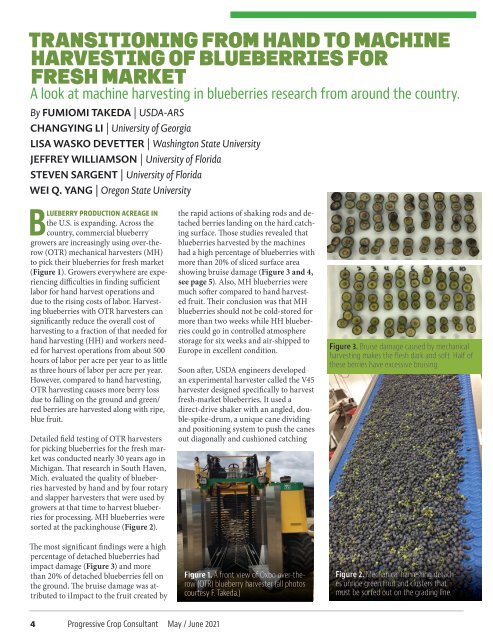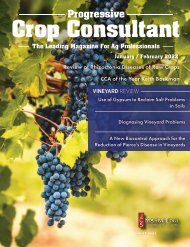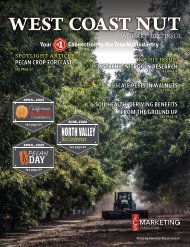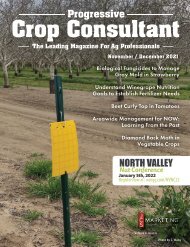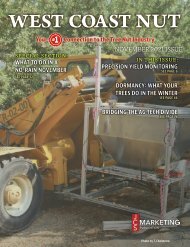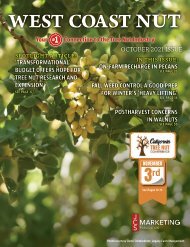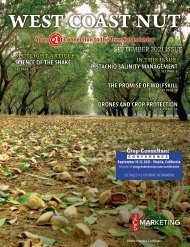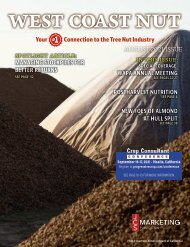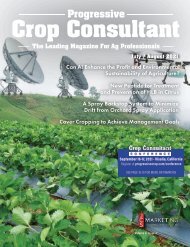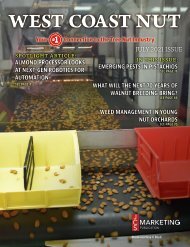Progressive Crop Consultant May/June 2021
You also want an ePaper? Increase the reach of your titles
YUMPU automatically turns print PDFs into web optimized ePapers that Google loves.
TRANSITIONING FROM HAND TO MACHINE<br />
HARVESTING OF BLUEBERRIES FOR<br />
FRESH MARKET<br />
A look at machine harvesting in blueberries research from around the country.<br />
By FUMIOMI TAKEDA | USDA-ARS<br />
CHANGYING LI | University of Georgia<br />
LISA WASKO DEVETTER | Washington State University<br />
JEFFREY WILLIAMSON | University of Florida<br />
STEVEN SARGENT | University of Florida<br />
WEI Q. YANG | Oregon State University<br />
Blueberry production acreage in<br />
the U.S. is expanding. Across the<br />
country, commercial blueberry<br />
growers are increasingly using over-therow<br />
(OTR) mechanical harvesters (MH)<br />
to pick their blueberries for fresh market<br />
(Figure 1). Growers everywhere are experiencing<br />
difficulties in finding sufficient<br />
labor for hand harvest operations and<br />
due to the rising costs of labor. Harvesting<br />
blueberries with OTR harvesters can<br />
significantly reduce the overall cost of<br />
harvesting to a fraction of that needed for<br />
hand harvesting (HH) and workers needed<br />
for harvest operations from about 500<br />
hours of labor per acre per year to as little<br />
as three hours of labor per acre per year.<br />
However, compared to hand harvesting,<br />
OTR harvesting causes more berry loss<br />
due to falling on the ground and green/<br />
red berries are harvested along with ripe,<br />
blue fruit.<br />
Detailed field testing of OTR harvesters<br />
for picking blueberries for the fresh market<br />
was conducted nearly 30 years ago in<br />
Michigan. That research in South Haven,<br />
Mich. evaluated the quality of blueberries<br />
harvested by hand and by four rotary<br />
and slapper harvesters that were used by<br />
growers at that time to harvest blueberries<br />
for processing. MH blueberries were<br />
sorted at the packinghouse (Figure 2).<br />
The most significant findings were a high<br />
percentage of detached blueberries had<br />
impact damage (Figure 3) and more<br />
than 20% of detached blueberries fell on<br />
the ground. The bruise damage was attributed<br />
to iImpact to the fruit created by<br />
the rapid actions of shaking rods and detached<br />
berries landing on the hard catching<br />
surface. Those studies revealed that<br />
blueberries harvested by the machines<br />
had a high percentage of blueberries with<br />
more than 20% of sliced surface area<br />
showing bruise damage (Figure 3 and 4,<br />
see page 5). Also, MH blueberries were<br />
much softer compared to hand harvested<br />
fruit. Their conclusion was that MH<br />
blueberries should not be cold-stored for<br />
more than two weeks while HH blueberries<br />
could go in controlled atmosphere<br />
storage for six weeks and air-shipped to<br />
Europe in excellent condition.<br />
Soon after, USDA engineers developed<br />
an experimental harvester called the V45<br />
harvester designed specifically to harvest<br />
fresh-market blueberries. It used a<br />
direct-drive shaker with an angled, double-spike-drum,<br />
a unique cane dividing<br />
and positioning system to push the canes<br />
out diagonally and cushioned catching<br />
Figure 1. A front view of Oxbo over-therow<br />
(OTR) blueberry harvester (all photos<br />
courtesy F. Takeda.)<br />
Figure 3. Bruise damage caused by mechanical<br />
harvesting makes the flesh dark and soft. Half of<br />
these berries have excessive bruising.<br />
Figure 2. Mechanical harvesting detaches<br />
unripe green fruit and clusters that<br />
must be sorted out on the grading line.<br />
4 <strong>Progressive</strong> <strong>Crop</strong> <strong>Consultant</strong> <strong>May</strong> / <strong>June</strong> <strong>2021</strong>


